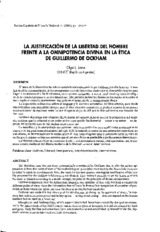La justificación de la libertad del hombre frente a la omnipotencia divina en la ética de Guillermo de Ockham
Autor
Larre, Olga L.
Editor
UCOPressFecha
2004Materia
OckhamLibertad
Omnipotencia
Autodeterminación
Determinismo
Freedom
Omnipotence
Self-determination
Determinism
METS:
Mostrar el registro METSPREMIS:
Mostrar el registro PREMISMetadatos
Mostrar el registro completo del ítemResumen
El tema de Ia libertad no ha sido considerado sistemáticamente por Ockham; por ello la autora lo analiza desde la circunscripción de los presupuestos metodológicos transitados por el Venerabilis Inceptor para llegar a su elaboración. Se fundamenta, en un primer momento, la nueva justificación gnoseo-ontologica de la realidad propuesta en el ockhamismo. Ello permite definir los límites en los cuales se inscribe el tema según un modelo fuertemente inspirado en el principio de la omnipotencia divina. La exposición ockhamista utiliza el lenguaje y la doctrina aristotélica del libre arbitrio, pero desde una semántica completamente diversa; pues la libre elección aristotélica se produce a partir de un primer reconocimiento de opciones entre las que el agente elige; de alii que la libertad resulte una función del intelecto. Ockham desestima este elemento fundamental del aristotelismo a! invertir la perspectiva del análisis; sostiene que la voluntad es un poder activo cuya opción fundamental -actuar o no actuar- no depende del intelecto sino de ella misma como causa sui. La metafísica y la antropología que sostienen esta concepción han sido modificadas sustancialmente respecto de las posiciones dominantes del siglo XIII: la naturaleza carece de una orientación especifica; no está abierta, ni determinada por la verdad ni por el bien. Solo el agente libre y consciente actúa en vista de un fin que el mismo se impone, mientras que el universo físico es predecible y perfectamente determinado. La libertad aparece como un comienzo frente a la determinación natural, configurándose, así, la primera versión medieval del dilema moderno de la libertad versus el determinismo The freedom issue has not.been systematically considered by Ockham; that is why the author approaches it from the point of view of the methodological principles examined by the Venerabilis Inceptor in order to reach its development. First, the basis for the new gnoseo-ontological justification of the reality proposed by the Ockham's followers is established. That makes it possible to set the limits in which the issue is framed according to a model strongly inspired in the principle of divine omnipotence. Ockham's approach uses the Aristotelian language and doctrine of free will, but from a completely different point of view; since the Aristotelian free will results from a first recognition of a number of possibilities from which the agent opt; then freedom is an intellectual capability. Ockham sets aside this key element of Aristotelianism by changing the approach of study; he supports that will is an active power and its key option -acting or not acting- does not depend on the human intellect but on itself as a causa sui. Metaphysic and Anthropology, which support this belief, have been materially changed as compared to the main trends of the XIII Century: nature lacks a specific direction; it is not determined by truth and good. Only the free and conscious agent acts towards and end established by himself while the physical universe is predictable and perfectly determined. Freedom is shown as a new reality against natural determination, thus shaping the first medieval version for the modern dilemma of freedom versus determinism.

